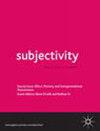Intuition as a “trained thing”: sensing, thinking, and speculating in computational cultures
IF 0.7
Q3 SOCIAL SCIENCES, INTERDISCIPLINARY
引用次数: 0
Abstract
Abstract What happens when intuition becomes algorithmic? This article explores how approaching intuition as recursively trained sheds light on what is at stake affectively, politically, and ethically in the entanglements of sensorial, cognitive, computational and corporate processes and (infra)structures that characterise algorithmic life. Bringing affect theory and speculative philosophies to bear on computational histories and cultures, I tease out the continuing implications of post-war efforts to make intuition a measurable and indexable mode of anticipatory knowledge. If digital computing pioneers tended to elide the more ambivalent implications of quantifying intuition, this article asks what computational myths are at play in current accounts of machine learning-enabled sensing, thinking, and speculating and what complexities or chaos are disavowed. I argue that an understanding of more-than-human intuition which grapples meaningfully with the indeterminacy central to digitally mediated social life must recognise that visceral response is recursively trained in multiple ways with diverse, and often contradictory, effects.直觉是一种“训练过的东西”:在计算文化中感知、思考和推测
当直觉变成算法时会发生什么?本文探讨了如何通过递归训练来接近直觉,从而揭示了在感官、认知、计算和企业过程以及表征算法生活的(基础设施)结构的纠缠中,在情感、政治和伦理上处于危险的是什么。我将情感理论和思辨哲学引入计算历史和文化,梳理出战后努力的持续影响,使直觉成为一种可测量和可索引的预期知识模式。如果数字计算先驱倾向于忽略量化直觉的更矛盾的含义,那么本文将询问在当前机器学习支持的感知、思考和猜测的描述中,哪些计算神话在起作用,哪些复杂性或混乱被否认。我认为,如果要理解超越人类的直觉,并有意义地与数字媒介社会生活的不确定性作斗争,就必须认识到,本能反应是通过多种方式递归地训练出来的,其效果是多样的,而且往往是相互矛盾的。
本文章由计算机程序翻译,如有差异,请以英文原文为准。
求助全文
约1分钟内获得全文
求助全文
来源期刊

Subjectivity
SOCIAL SCIENCES, INTERDISCIPLINARY-
CiteScore
1.00
自引率
20.00%
发文量
17
期刊介绍:
Subjectivity is an international, transdisciplinary journal examining the social, cultural, historical and material processes, dynamics and structures of human experience. As topic, problem and resource, notions of subjectivity are relevant to many disciplines, including cultural studies, sociology, social theory, geography, anthropology and psychology. The journal brings together scholars from across the social sciences and the humanities, publishing high-quality theoretical and empirical papers that address the processes by which subjectivities are produced, explore subjectivity as a locus of social change, and examine how emerging subjectivities remake our social worlds.
 求助内容:
求助内容: 应助结果提醒方式:
应助结果提醒方式:


